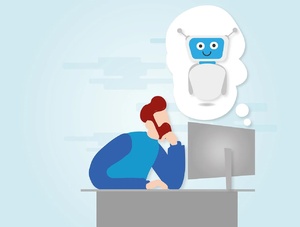Everybody is talking about AI, especially in the world of recruiting. Companies love AI powered tools because they make their hiring processes more efficient and their recruiters more productive. But how do the candidates feel about these tools? Are they feeling the love? Not so much.
A recent Pew Research study about using artificial intelligence when hiring and evaluating workers reveals mixed opinions.
The Pew Research study shows that most Americans surveyed (72%) are opposed to AI making final hiring decisions. Some are receptive to the idea of AI being involved in part of the hiring process, but not making the final decision — 41% say they oppose the idea of AI reviewing job applications, while 28% favor it and 30% are unsure.
American adults are more split on whether they favor or oppose the use of AI to track workers’ productivity and handle other day-to-day management tasks. Out of all respondents, 47% oppose the idea of using AI analysis of worker performance to make decisions about who to promote, while 22% favor it.
The numbers are similarly split on other ways in which AI used to track productivity might reduce privacy. Of the survey respondents, 51% oppose using AI to track exactly what workers are doing on their work computers, while 27% favor it and 22% are unsure. A large majority (70%) oppose using AI to analyze employees’ facial expressions, the least popular use case posed by the survey.
But out of all the data collected, a comment from a person surveyed really resonated with me. When asked, “Would you want to apply for a job that uses AI to help make hiring decisions?” One person, a woman in her 40’s said no, and gave this reason why.
“It would lack/overlook the human factor. What if I don’t have the ‘right’ keywords on my application? Would I be dismissed outright? I would need to learn more about AI to feel more comfortable with it.”
In total, 66% said they would not want to apply to a workplace that uses artificial intelligence to help in hiring decisions; another 32% said they would still apply. The remaining percentage did not give an answer.
I find all of this fascinating because there are a lot of HR Tech tools being built on AI. At last count, I think it was – all of them. So, in light of these findings, how do companies reconcile their purchase decisions?
· Transparency – Its going to be evident that some tools are going to be used in the process. Explain to candidates that these tools are tools and that people make the decision. After all, when you work for Company X, you report to a person, not a machine. So, make it clear that humans make hiring decisions and promotion decisions.
· Make data accessible – When using tech to track worker activity, make the data accessible to the worker so they can explain anything that could be misperceived as something else. Do not set up a culture where a machine said you were not working and based on that alone, we are firing you. I can only imagine the stack of lawsuits that would inspire.
· Complaint platform – Set up a 3rd party to arbitrate complaints. For employees, that is HR. For candidates and job applicants, that could be laws like the Automated Employment Decision Tools law in NYC which requires that the use of AI tech leveraged in employment decisions to be screened and audited on a yearly basis to ensure its use will not result in discrimination or disparate impact.
But hey, that’s just one guy’s opinion. What’s yours?





